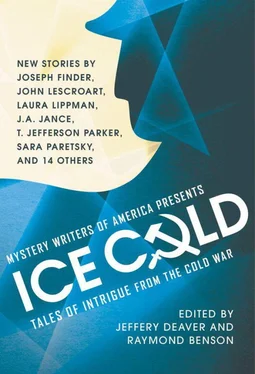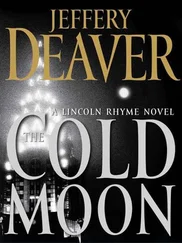“Yes.” I carried the pot of goulash to the table. “It sounds like a John le Carré novel.” I struggled to keep my voice light. “Sit down, Roy, and let’s eat.”
He pulled out my chair with a flourish. He was enjoying himself, demonstrating just how clever he was. “Don’t you want to hear the punch line?”
“You mean there’s more?” I gave a gay little laugh and spooned goulash onto his plate and then mine. I took my napkin, spreading it carefully onto my lap.
“Yes. The best part, you might say.” He put a forkful of the steaming noodles up to his lips and blew on them. “The agent we were questioning said that the German spy was known to be ruthless, with a strange trait: an almost sadistic hatred of poor penmanship.” He paused. “I’ll never forget what he did, Rachel. He held up his hands, like this,” Roy spread his fingers out, palms toward me, “and he was missing the middle finger from each. The agent had hacked them off to teach him a lesson.”
“Quite the story.”
“Isn’t it? Now you can see why I thought of you.”
“I see—my flair for the dramatic? My skills with a butcher knife?” I tried to smile.
“Your reaction to that signature yesterday.”
“I’m flattered that you think I could have been—could still be—a notorious spy.” I took a gulp of my wine. “Try the goulash.”
“Sure smells heavenly.” He peered down at his fork. “These mushrooms remind me of the ones we ate in Austria, the heaping basketfuls you gathered in the Vienna woods.”
“Yes,” I said. The same mushrooms I’d picked as a girl in Hechingen, and later in the forest outside Moscow. The ones often confused with deadly Amanitas , a small quantity of which I kept dried in a jar among the spices.
He took a bite, chewed, and gagged violently.
I watched him slump to the floor. Several moments later I would take his pulse, grind up the goulash in my garbage disposal, and carefully wash and dry the dishes. I would put dessert on the table, compose myself, and phone for an ambulance. But first, I bent down and kissed his cooling cheek.
“It’s over,” Roy rasped. “Can’t you see that it’s over?”
I knew he was referring to the Cold War, and I gave a sad smile. “Not for me, Roy. It will never be over for me.” A thin trickle of spittle seeped from his mouth as I sat back on my haunches. “ Auf Wiedersehen .”
How often in the weeks that have followed have I wished for a different ending to Roy’s story? Wished that he had never made the connection exposing me, wished that he had not been the one to list my house, wished with all my heart that he’d anticipated my lethal nature? Even as I watched the emergency responders try to restart Roy’s heart, I pictured the way a different scenario might have played out. I saw Roy, raising a hidden gun, firing, and my world going black. Roy, realizing that my cover had to be protected at all costs because it was the only world I had ever known.
My wishes all vanished when they wheeled him away.
Now I rise at dawn to take my walks. I listen to stories, eat oatmeal. I keep my secrets and save my memories, especially those of good friends who were hell to put down.
EAST MEETS WEST
BY JONATHAN STONE
Yes, sure, joy, celebration, jubilation, dancing in the streets, standing atop it triumphantly with upraised fists for the world’s photographers, rock music blasting from open apartment windows, spray painting the dirty grim brick and stone in exuberant neon red and orange and blue, happy vodka- and schnapps-fueled reunions and toasts and excitement and tears of gratitude, yes, sure, but now there is also the jurisdictional nightmare, the integration of Berlin city services separated for almost three decades, subway line and bus line confusion, new hospital assignments and emergency vehicle routes, new patrol zones and a new public safety management grid, and that is why I am striding, in cold November, two days after the fall of the Wall, to meet one Inspector Alexander Grimmenkauf at one of the old checkpoints, because the investigation’s thin trail of evidence so far winds a path on both sides.
Because amid the joy and jubilation and celebration, a young woman has been murdered.
And if you were to observe this meeting—say, from one of the celebratory open apartment windows—you would laugh at the cliché of it, because I am so West German—from my leather jacket and moptop black hair (an indirect legacy of the Beatles’ famed Hamburg stint), to sloppy mustache, to my jazz CD collection, to my sweet blond American girlfriend, Susie (dozing this morning at my pad on Tiergartenstrasse), and Grimmenkauf (whose reputation precedes him) is so Eastern bloc—stepping out of the past and out of one of those noir American films Susie and I have been seeing—trenchcoat, collar turned up, black fedora. Short, squat, compact, and powerful beneath it. Classic Stasi. As schooled in torture and coercion and confession as I am schooled in forensic techniques and databases. As steeped in enforcement’s murky ugly past as I am in police work’s best practices and weekly white papers. And the idea of our working together—of my selection for the case, and of his—with our methods so utterly separated by technology, culture, style, police law—is someone’s idea of a joke. A lab experiment assembled by our respective departments. Even our ages conspire in the metaphor—I am just thirty, looking forward in career and life, he is past sixty, looking back at both.
“Herr Grimmenkauf.”
“Herr Bunder.”
He shakes my hand, glances up at me merely dutifully, and allows only the briefest ironic smile—just enough to tell me that he knows too, what a joke this is. Some administrative committee’s hasty response to sudden shifting conditions. Symbolic. And ridiculous.
And then—no preliminaries, no chat from him. “We can walk to the crime scene and the morgue,” he says flatly. “In that way, a very convenient murder.” He turns, and begins leading me.
Making it clear. I’m not going to be a poster boy for détente. For Western victory and normalization. Let’s figure this out, and go our separate ways as quickly as possible.
Cops don’t walk on the Western side, we’ll take our Mercedes sedans even two blocks. But Grimmenkauf walks, I learn. And as I fall in silently behind him, I notice the limp, of course. Trenchcoat, turned-up collar, gruff monosyllables—and he’s even got the grim limp. Noir on noir. You couldn’t make this guy up.
We walk in silence. And it is walking through the past. Floating through an alternate universe existing alongside my own. Through the trash, and the crumbling, and the decades of sorrow and isolation and imprisonment, and two days later there is still jubilation and smiling and energy from the people, but the buildings around them, the crumbling infrastructure and roadway beneath them, are the vision into what their lives have been. The stunning events of the last two days don’t suddenly erase the last thirty years.
The morgue is as primitive as I expected. Slabs in a basement room, indecipherable paperwork and record-keeping, grumbling resentful functionaries who recite the rules mindlessly and unbending. A dead woman on a slab in a basement morgue: to me, a perfect summation of East Germany.
“Anna Hoppler,” Grimmenkauf says, as we stand over her. “Twenty-four. Graduate student in pharmacology. Found at 31 Strasse Aussenlander. Multiple blows to the skull with a blunt instrument,” he recites with what must be an Eastern bloc sense of irony, because we are looking at a thoroughly crushed-in cranium. Just about enough, coupled with the displaced cranial and facial bone, to obliterate the vision of her original beauty—but not quite.
Читать дальше












